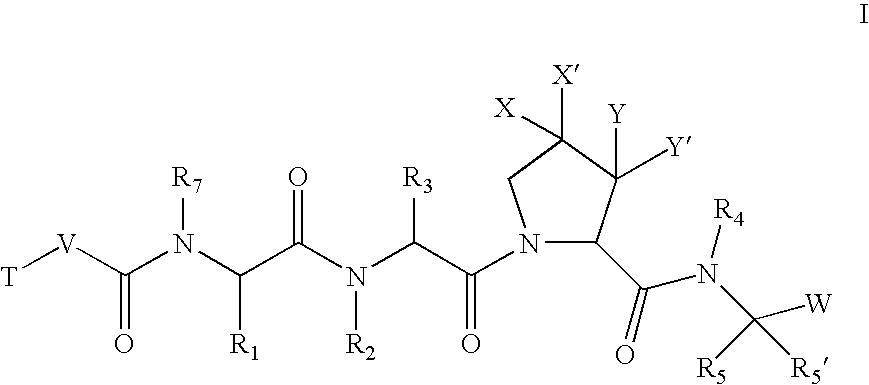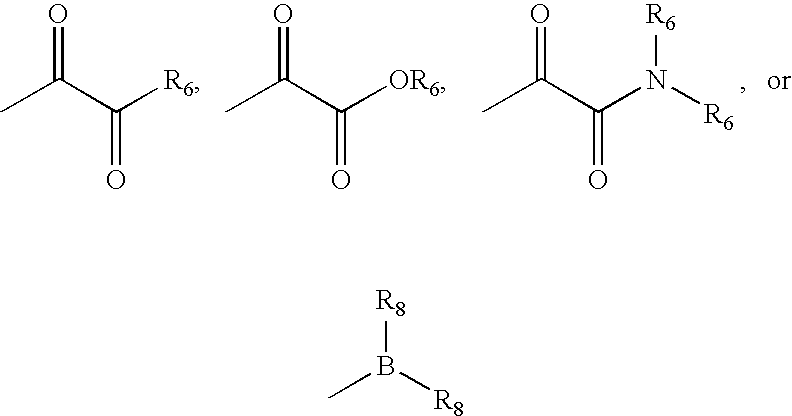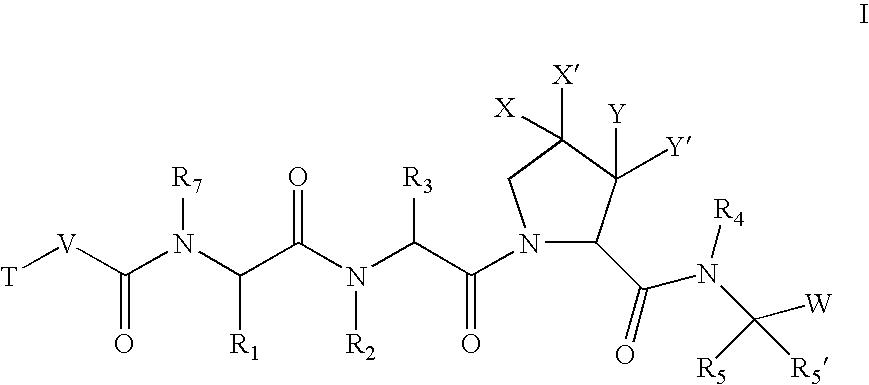Inhibitors of serine proteases, particularly HCV NS3-NS4A protease
- Summary
- Abstract
- Description
- Claims
- Application Information
AI Technical Summary
Benefits of technology
Problems solved by technology
Method used
Image
Examples
embodiments
According to one embodiment, the compounds of the present invention are of formula I:
or a pharmaceutically acceptable salt thereof,
wherein: X and X′ are both fluorine; or X and X′ are independently C(H), N, NH, O, or S; and X and X′ are taken together with the carbon atom to which they are bound to form a 5- to 7-membered saturated or partially unsaturated ring having up to 4 heteroatoms independently selected from N, NH, O, S, SO, and SO2; wherein any atom is optionally singly or multiply substituted with up to 3 substituents selected independently from J; and wherein said ring is optionally fused to a second ring selected from (C6-C10)aryl, (C5-C10)heteroaryl, (C3-C10)cycloalkyl, and a (C3-C10)heterocyclyl, wherein said second ring has up to 3 substituents selected independently from J; J is halogen, —OR′, —NO2, —CN, —CF3, —OCF3, —R′, oxo, thioxo, ═N(R′), ═N(OR′), 1,2-methylenedioxy, 1,2-ethylenedioxy, —N(R′)2, —SR′, —SOR′, —SO2R′, —SO2N(R′)2, —SO3R′, —C(O)R′, —C(O)C(O)R′...
example 1
3-acetyl-4,5-dimethyl-2-pyrrole carboxylic Acid (5b)
A solution of sodium nitrite (36.9 g, 0.534 mol) in 70 mL of water was added dropwise to a stirred solution of ethylacetoacetate (70 g, 0.538 mol) in 1401 mL of glacial acetic acid at 0° C. After the addition was complete, the light yellow reaction mixture was allowed to warm to room temperature. After 30 minutes, all the starting material had been consumed, the reaction was quenched with 350 mL of water and extracted with ethyl acetate (2×125 mL). The organic extracts were combined and washed with water (2×125 mL) and saturated sodium hydrogen carbonate aqueous solution (2×105 mL). The organic layer was dried with sodium sulfate and concentrated in vacuo to give 84.2 g (98%) of ethyl-2-Hydroxyimino-3-oxobutanoate 1b as a pale yellow oil.
1H NMR (CDCl3) d 10.3 (s, 1H), 4.2 (q, 2H), 2.3 (s, 3H), 1.3 (t, 3H) ppm.
Crushed sodium (12.4 g, 0.540 mol) was added to a solution of 2-butanone (48.2 mL, 0.538 mol) and ethyl formate (43.47 ...
example 2
2-(2-{2-cyclohexyl-2-[(pyrazine-2-carbonyl)-amino]-acetylamino}-3,3-dimethyl-butyryl)-6,10-dithia-2-azaspiro[4.5]decane-3-carboxylic Acid(1-cyclopropylaminooxalyl-butyl)-amide (2a)
To a solution of L-4-hydroxy-pyrrolidine-1,2-dicarboxylic acid 1-benzyl ester 2-methyl ester 1 (3.0 g, 1.0 eq, Advanced Chem Tech) in toluene (30 mL) / ethyl acetate (30 mL) was added NaBr (1.28 g, 1.14 eq) in water (5 mL). TEMPO (17 mg) was added, the mixture cooled to 4° C. and a solution of Clorox® (18 mL), sodium bicarbonate (2.75 g) and water (to 40 mL total volume) was added over 30 minutes. The resulting suspension was stirred 10 minutes before adding isopropanol (0.2 mL). The organic phase was separated and the aqueous phase extracted with ethyl acetate. The combined organic layers were washed with a 0.3 N solution of sodium thiosulfate and then brine, dried over sodium sulfate, filtered, and concentrated in vacuo to an amber oil. Purification via a silica gel plug eluting with an EtOAc / hexanes gra...
PUM
| Property | Measurement | Unit |
|---|---|---|
| Energy | aaaaa | aaaaa |
| Bond | aaaaa | aaaaa |
Abstract
Description
Claims
Application Information
 Login to View More
Login to View More - R&D
- Intellectual Property
- Life Sciences
- Materials
- Tech Scout
- Unparalleled Data Quality
- Higher Quality Content
- 60% Fewer Hallucinations
Browse by: Latest US Patents, China's latest patents, Technical Efficacy Thesaurus, Application Domain, Technology Topic, Popular Technical Reports.
© 2025 PatSnap. All rights reserved.Legal|Privacy policy|Modern Slavery Act Transparency Statement|Sitemap|About US| Contact US: help@patsnap.com



